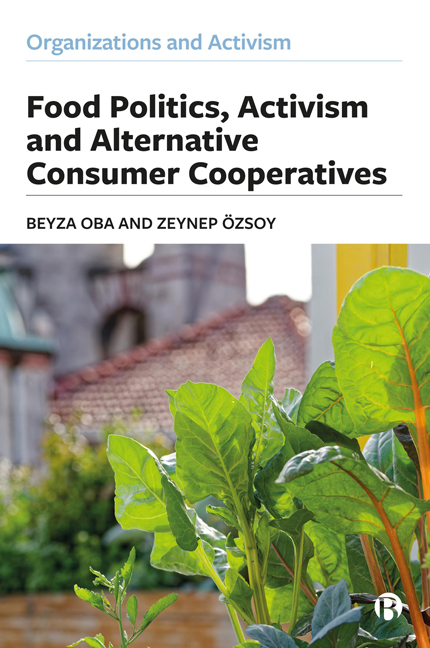Book contents
- Frontmatter
- Contents
- Series Editors’ Preface
- 1 Introduction: Experimenting with Direct Democracy
- 2 The Politics of Food: Alignment for Solidarity and Resistance
- 3 Against Neo-Liberalism and Authoritarianism: The Background to Food Politics in Turkey
- 4 The Political Economy of Consumer Cooperatives in Turkey
- 5 Alternative Consumer Cooperatives in the Making of a Public Sphere
- 6 Experimenting with an Alternative to the Capitalist Food Provisioning System
- 7 The Governance of Alternative Consumer Cooperatives
- 8 Instead of a Conclusion
- Notes
- References
- Index
3 - Against Neo-Liberalism and Authoritarianism: The Background to Food Politics in Turkey
Published online by Cambridge University Press: 27 March 2024
- Frontmatter
- Contents
- Series Editors’ Preface
- 1 Introduction: Experimenting with Direct Democracy
- 2 The Politics of Food: Alignment for Solidarity and Resistance
- 3 Against Neo-Liberalism and Authoritarianism: The Background to Food Politics in Turkey
- 4 The Political Economy of Consumer Cooperatives in Turkey
- 5 Alternative Consumer Cooperatives in the Making of a Public Sphere
- 6 Experimenting with an Alternative to the Capitalist Food Provisioning System
- 7 The Governance of Alternative Consumer Cooperatives
- 8 Instead of a Conclusion
- Notes
- References
- Index
Summary
Introduction
How did alternative consumer cooperatives (ACCs) emerge and how do they function within a context characterized by an exit from democracy, the rise of political Islamism and the populist neo-liberal policies (see, for example, David and Toktamış, 2015; Toktamış and David, 2015; David, 2016; Öktem and Akkoyunlu, 2016; Özden et al., 2017; Çalışkan, 2018; Adaman et al, 2019; Toktamış, 2019; Adaman and Akbulut, 2020)? In a political and economic milieu characterized by the dominance of a strong state tradition and a commitment to the premises of neo-liberal policies, affecting various aspects of social and economic life as well as the daily practices of citizens, how did a non-capitalist form of organizing emerge from those excluded from the political and economic realm? What were the major factors that mobilized the urban middle class to build networks of solidarity with other excluded groups and the petty commodity producers?
Although the neo-liberal turn in Turkey started with the 1980 structural adjustment programme, its full-blown implementation happened in the early 2000s when the ruling party, with the guidance of international organizations, instigated a political project to refashion Turkish society by combining neo-liberal economic policies, democracy and Islam (Çelik, 2015; Tuğal, 2015; David, 2016; Tansel, 2018). The model, usually described as ‘passive revolution’ in Gramscian terms (Tuğal, 2009), was implemented in a top-down fashion by the appointed bureaucrats and elected politicians. This neo-liberal Islamic model was successful in facilitating the inclusion of some groups (pro-government entrepreneurs, journalists, academics, bureaucrats) to the economic and political domains of society. The model also had a neo-liberal populist character in its capacity to include the new urban poor and informal sector workers by addressing their needs for housing and social assistance (Özden and Bekmen, 2015; Batuman, 2019). The government took certain initiatives (gentrification, low interest rates) to solve the informal housing (gecekondu) problems which later gave way to urban exclusion and the occupation of public spaces by mosques and shopping malls (Alonso, 2015). This neo-liberal populist, political Islamist project with its emphasis on the inclusion of the urban poor with the pro-AKP factions was, at the same time, exclusionary (Tuğal, 2015).
- Type
- Chapter
- Information
- Publisher: Bristol University PressPrint publication year: 2023

